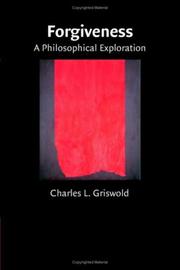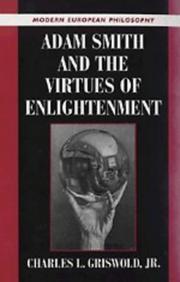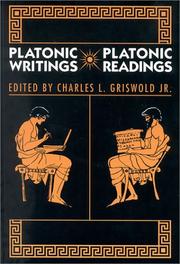| Listing 1 - 10 of 13 | << page >> |
Sort by
|

ISBN: 9780521878821 9780521703512 0521703514 0521878829 9780511619168 9780511350184 051135018X 0511619162 0511348355 9780511348358 1107183596 1281086258 9786611086251 0511351089 0511574037 0511349327 9780511349324 9780511351082 9781281086259 Year: 2007 Publisher: Cambridge Cambridge University Press
Abstract | Keywords | Export | Availability | Bookmark
 Loading...
Loading...Choose an application
- Reference Manager
- EndNote
- RefWorks (Direct export to RefWorks)
Nearly everyone has wronged another. Who among us has not longed to be forgiven? Who has not struggled to forgive? Charles Griswold has written the first comprehensive philosophical book on forgiveness in both its interpersonal and political contexts, as well as its relation to reconciliation. Having examined the place of forgiveness in ancient philosophy and in modern thought, he discusses what forgiveness is, what conditions the parties to it must meet, its relation to revenge and hatred, when it is permissible and whether it is obligatory, and why it is a virtue. Griswold argues that forgiveness (unlike apology) is inappropriate in politics, and analyzes the nature and limits of political apology with reference to historical examples (including Truth and Reconciliation Commissions). The book concludes with an examination of the relation between memory, narrative, and truth.
General ethics --- Forgiveness. --- Pardon --- Reconciliation. --- Peace making --- Peacemaking --- Reconciliatory behavior --- Quarreling --- Unforgiveness --- Conduct of life --- Absolution --- Amnesty --- Clemency --- Arts and Humanities --- Philosophy
Book
ISBN: 0300035942 0300043678 9780300035940 9780300043679 Year: 1986 Publisher: New Haven London Yale University Press
Abstract | Keywords | Export | Availability | Bookmark
 Loading...
Loading...Choose an application
- Reference Manager
- EndNote
- RefWorks (Direct export to RefWorks)
Affection --- Ame --- Amour --- Ancient rhetoric --- Antieke retoriek --- Connaissance de soi [Theorie de la ] --- Introspection (Theory of knowledge) --- Knowledge [Reflexive ] --- Knowledge of self [Theory of ] --- Liefde --- Love --- Reflexive knowledge --- Retoriek [Antieke ] --- Retoriek van de Oudheid --- Rhetoric [Ancient ] --- Rhétorique ancienne --- Rhétorique de l'Antiquité --- Self-knowledge [Theory of ] --- Soul --- Zelfkennis [Theorie van de ] --- Ziel --- Rhetoric, Ancient --- Self-knowledge, Theory of --- Plato --- Lysias --- Socrates --- Pneuma --- Future life --- Philosophical anthropology --- Theological anthropology --- Animism --- Spirit --- Knowledge, Reflexive --- Knowledge of self, Theory of --- Reflection (Theory of knowledge) --- Knowledge, Theory of --- Personality (Theory of knowledge) --- Self (Philosophy) --- Classical languages --- Greek language --- Greek rhetoric --- Latin language --- Latin rhetoric --- Emotions --- First loves --- Friendship --- Intimacy (Psychology) --- Rhetoric --- Socrate --- Socrates Constantinopolitanus Scholasticus --- Aflāṭūn --- Aplaton --- Bolatu --- Platon, --- Platonas --- Platone --- Po-la-tʻu --- Pʻŭllatʻo --- Pʻŭllatʻon --- Pʻuratʻon --- Πλάτων --- אפלטון --- פלאטא --- פלאטאן --- פלאטו --- أفلاطون --- 柏拉圖 --- 플라톤 --- Lusias --- Lisia --- Lisias --- Love. --- Rhetoric, Ancient. --- Self-knowledge, Theory of. --- Soul. --- Λυσίας --- Lysias. --- Plato. --- Socrates. --- Sokrates
Book
ISBN: 0415001870 9780415001878 Year: 1988 Publisher: New York (N.Y.): Routledge
Abstract | Keywords | Export | Availability | Bookmark

ISBN: 0521628911 9780521628914 0521621275 Year: 1999 Publisher: Cambridge Cambridge University Press
Abstract | Keywords | Export | Availability | Bookmark
 Loading...
Loading...Choose an application
- Reference Manager
- EndNote
- RefWorks (Direct export to RefWorks)
Ethics, Modern --- Smith, Adam, --- Ethics. --- Smith, Adam
Book
ISBN: 9781138218956 9781315436548 9781315436579 1138218952 Year: 2018 Publisher: (London): Routledge
Abstract | Keywords | Export | Availability | Bookmark
 Loading...
Loading...Choose an application
- Reference Manager
- EndNote
- RefWorks (Direct export to RefWorks)
Jean-Jacques Rousseau and Adam Smith are giants of eighteenth century thought. The heated controversy provoked by their competing visions of human nature and society still resonates today. Smith himself reviewed Rousseau's Discourse on Inequality, and his perceptive remarks raise an intriguing question: what would a conversation between these two great thinkers look like? In this outstanding book Charles Griswold analyzes, compares and evaluates some of the key ways in which Rousseau and Smith address what could be termed "the question of the self". Both thinkers discuss what we are by nature (in particular, whether we are sociable or not), who we have become, whether we can know ourselves or each other, how best to articulate the human condition, what it would mean to be free, and whether there is anything that can be done to remedy our deeply imperfect condition. In the course of examining their rich and contrasting views, Griswold puts Rousseau and Smith in dialogue by imagining what they might say in reply to one another. Griswold's wide-ranging exploration includes discussion of issues such as narcissism, self-falsification, sympathy, the scope of philosophy, and the relation between liberty, religion and civic order. A superb exploration of two major philosophers, Jean-Jacques Rousseau and Adam Smith: A Philosophical Encounter is essential reading for students and scholars of these two figures, eighteenth century philosophy, the Enlightenment, moral philosophy, and the history of ideas. It will also be of interest to those in related disciplines such as political theory, economics, and religion.
Self-knowledge, Theory of --- Self (Philosophy) --- Self --- Rousseau, Jean-Jacques, --- Smith, Adam, --- Rousseau, Jean-Jacques, - 1712-1778 --- Smith, Adam, - 1723-1790

ISBN: 9780521628914 0521621275 9780511608964 9780521621274 0521628911 0511608969 Year: 1999 Publisher: Cambridge Cambridge University Press
Abstract | Keywords | Export | Availability | Bookmark
 Loading...
Loading...Choose an application
- Reference Manager
- EndNote
- RefWorks (Direct export to RefWorks)
Charles Griswold has written a comprehensive philosophical study of Smith's moral and political thought. Griswold sets Smith's work in the context of the Enlightenment and relates it to current discussions in moral and political philosophy. Smith's appropriation as well as criticism of ancient philosophy, and his carefully balanced defence of a liberal and humane moral and political outlook, are also explored. This 1999 book is a major philosophical and historical reassessment of a key figure in the Enlightenment that will be of particular interest to philosophers and political and legal theorists, as well as historians of ideas, rhetoric, and political economy.
Smith, Adam --- Arts and Humanities --- Philosophy --- Ethics, Modern - 18th century. --- Ethics, Modern --- Smith, Adam, --- Ethics.

ISBN: 0271021373 Year: 2002 Publisher: University Park, PA : Pennsylvania State University Press,
Abstract | Keywords | Export | Availability | Bookmark
Book
Year: 1998 Publisher: Cambridge, U. K. New York Cambridge University Press
Abstract | Keywords | Export | Availability | Bookmark
 Loading...
Loading...Choose an application
- Reference Manager
- EndNote
- RefWorks (Direct export to RefWorks)
Book
ISBN: 9780367884994 Year: 2019 Publisher: London : Routledge,
Abstract | Keywords | Export | Availability | Bookmark
 Loading...
Loading...Choose an application
- Reference Manager
- EndNote
- RefWorks (Direct export to RefWorks)
Jean-Jacques Rousseau and Adam Smith are giants of eighteenth century thought. The heated controversy provoked by their competing visions of human nature and society still resonates today. Smith himself reviewed Rousseau's Discourse on Inequality, and his perceptive remarks raise an intriguing question: what would a conversation between these two great thinkers look like?In this outstanding book Charles Griswold analyzes, compares and evaluates some of the key ways in which Rousseau and Smith address what could be termed "the question of the self". Both thinkers discuss what we are by nature (in particular, whether we are sociable or not), who we have become, whether we can know ourselves or each other, how best to articulate the human condition, what it would mean to be free, and whether there is anything that can be done to remedy our deeply imperfect condition. In the course of examining their rich and contrasting views, Griswold puts Rousseau and Smith in dialogue by imagining what they might say in reply to one another. Griswold’s wide-ranging exploration includes discussion of issues such as narcissism, self-falsification, sympathy, the scope of philosophy, and the relation between liberty, religion and civic order.A superb exploration of two major philosophers, Jean-Jacques Rousseau and Adam Smith: A Philosophical Encounter is essential reading for students and scholars of these two figures, eighteenth century philosophy, the Enlightenment, moral philosophy, and the history of ideas. It will also be of interest to those in related disciplines such as political theory, economics, and religion.
Book
ISBN: 9780521119481 9780511978654 0521119480 Year: 2012 Publisher: Cambridge Cambridge University Press
Abstract | Keywords | Export | Availability | Bookmark
 Loading...
Loading...Choose an application
- Reference Manager
- EndNote
- RefWorks (Direct export to RefWorks)
"In this book, twelve eminent scholars of classical antiquity and ancient and medieval Judaism and Christianity explore the nature and place of forgiveness in the pre-modern Western world. They discuss whether the concept of forgiveness, as it is often understood today, was absent, or at all events more restricted in scope than has been commonly supposed, and what related ideas (such as clemency or reconciliation) may have taken the place of forgiveness. An introductory chapter reviews the conceptual territory of forgiveness and illuminates the potential breadth of the idea, enumerating the important questions a theory of the subject should explore. The following chapters examine forgiveness in the contexts of classical Greece and Rome; the Hebrew Bible, the Talmud, and Moses Maimonides; and the New Testament, the Church Fathers, and Thomas Aquinas"--
Religion --- --Pardon --- --Christianisme --- --Judaïsme --- --Religions antiques --- --Forgiveness --- Forgiveness --- Religious aspects --- Christianity --- Judaism --- Ancient & Classical --- Ancient & Classical. --- Forgiveness. --- Philosophy --- Christianity. --- Judaism. --- History & Surveys --- General ethics --- Pardon --- Christianisme --- Judaïsme --- Religions antiques --- Forgiveness - Religious aspects - Christianity --- Forgiveness - Religious aspects - Judaism
| Listing 1 - 10 of 13 | << page >> |
Sort by
|

 Search
Search Feedback
Feedback About UniCat
About UniCat  Help
Help News
News